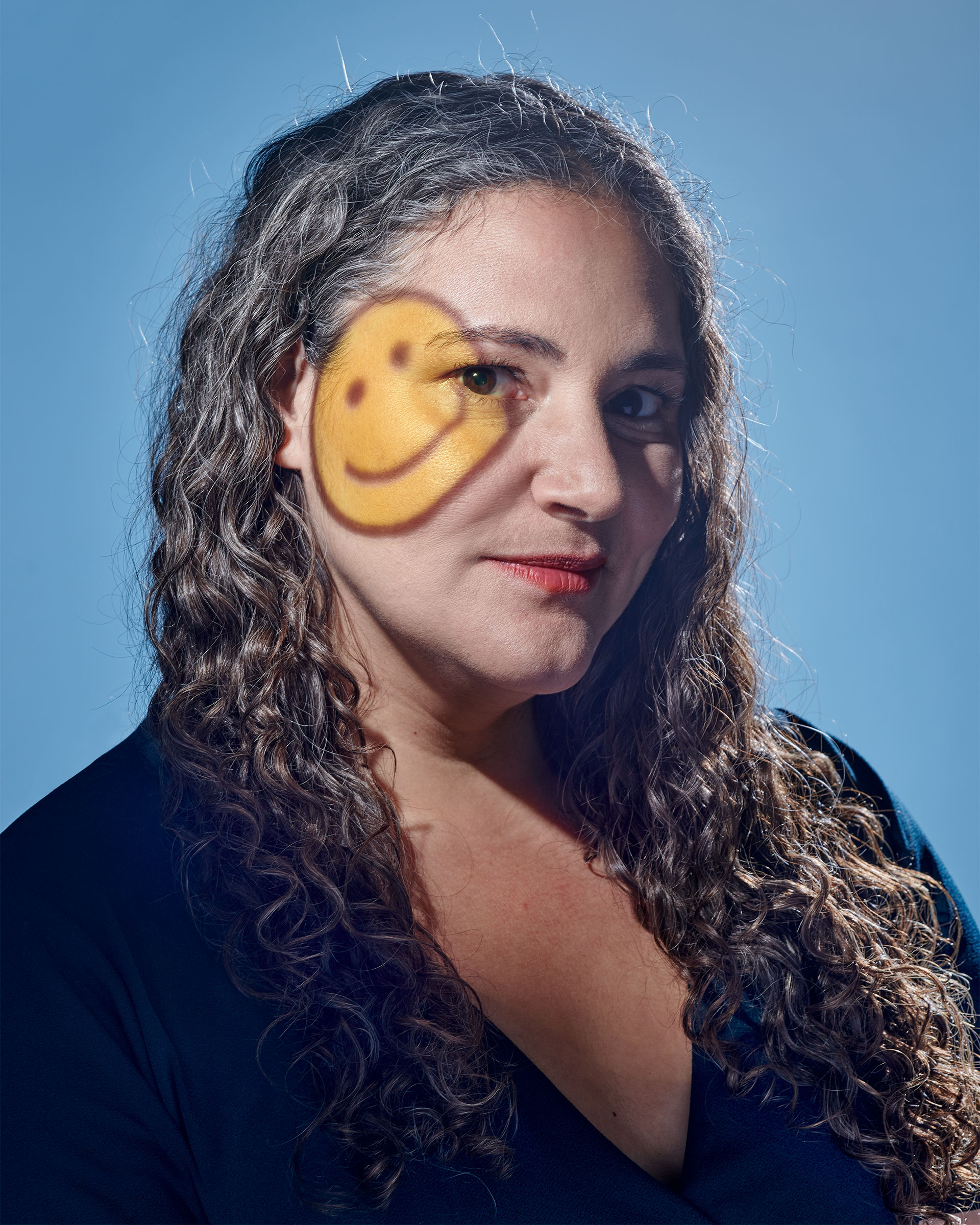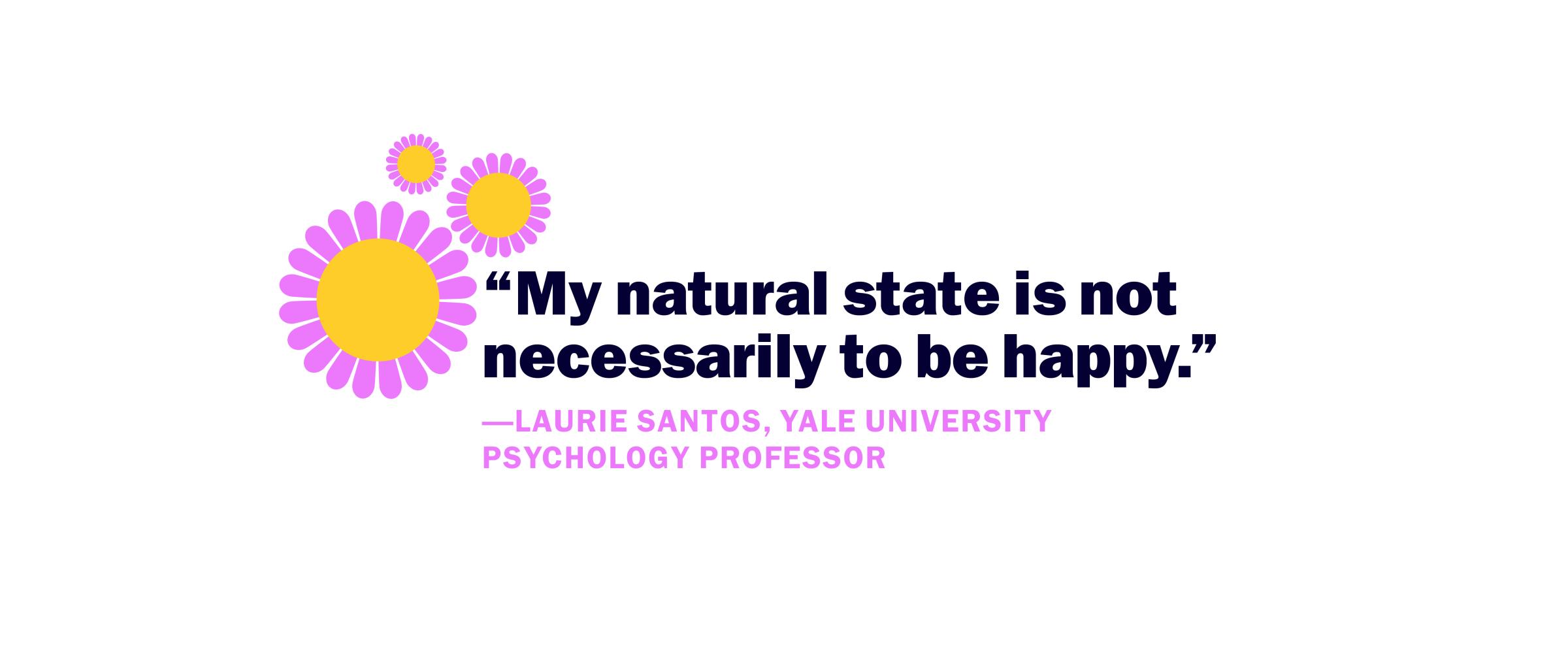
A dental emergency was Laurie Santos’ wake-up call. It wasn’t even her own: One of Santos’ students at Yale University needed her sign-off before getting some work done. Instead of feeling sympathy for her student, Santos mostly felt annoyed about the extra paperwork she’d need to complete.
That reaction was unusual and concerning for Santos, a psychologist who teaches Yale’s single most popular course, on the science of happiness. She knew that cynicism, irritability, and exhaustion—all of which had been gnawing at her recently—were telltale signs of burnout, a condition that almost 30% of U.S. workers say they experience at least sometimes, according to a 2022 McKinsey Health Institute survey.
Those weren’t the only red flags for Santos. Her plate felt too full. Her fuse was shorter. Two years into the pandemic, she was tired of bending the on-campus college experience to fit a remote world. “I take such pride and compassion in working with students, and to feel like that was getting chipped away” was worrisome, Santos says. To avoid sinking into full-on burnout, she decided to take a year off from Yale and temporarily move with her husband to Cambridge, Mass.
“I’m trying to practice what I preach, both because I think that’s an authentic way to show, ‘See, seriously, this works,’” Santos says. “But also, I want to be happy.”
Santos knows what you’re probably thinking at this point: Why bother trying to be happy if even the happiness expert is burned out? But that’s the wrong takeaway, she insists. The right one is that no one is immune to burnout—especially in times as stressful as these—but we all have the power to change our situations.
When Santos introduced her course, Psychology and the Good Life, in 2018, it quickly became the most popular in Yale’s history. More than 1,000 students enrolled, leading to logistical problems including finding a large enough auditorium and dealing with traffic jams in the dining hall as a quarter of undergraduates attempted to grab meals before heading to the same class.
Santos had a hunch the course would have wide appeal. She’d decided to start teaching it after observing Yale’s stressed-out students, who were constantly anxious about grades and their futures, seemingly muscling through rather than enjoying college. Staggering statistics around mental-health conditions and suicidal thinking on college campuses cemented her desire to help. “We’re not doing our jobs educationally if 60% of students are overwhelmingly anxious,” Santos says.
The course’s on-campus popularity led Santos to develop a free online version open to anyone, a soon-to-launch curriculum for high schoolers, and the Happiness Lab podcast, which has been downloaded more than 90 million times since it launched in 2019. That her scientific approach to happiness has spawned an empire should come as no surprise: fewer than 20% of Americans said they were very happy in a 2022 Ipsos survey, and more than 25% of U.S. adults said they were too stressed to function in a 2022 American Psychological Association poll.
There’s no single explanation for the rampant unhappiness, but Santos says some of it goes back to the way humans are wired. Our brains are good at lots of things, but making us happy isn’t necessarily one of them. Often, Santos says, the brain is an active saboteur. After a long day, it tells you what you really need is a pint of ice cream and a Netflix binge when, in fact, research shows you’d be better served by calling a friend, getting some exercise, or doing just about anything besides zoning out. Or, your brain convinces you that you need a fancy job, a huge salary, or a blue check mark on Instagram to be happy, when these external accomplishments often bring only fleeting satisfaction. “Natural selection isn’t into us being happy,” Santos says. “It would [prefer] we drove ourselves into the ground trying to survive, reproduce, and get the most resources. It’s not in it for joy.”
Santos’ class delves into the research around what people think will make them happy (money, status, good grades) vs. what science suggests actually will—namely, things that ensure both physical health (sleep, exercise, nutrition) and mental well-being (community, gratitude, mindfulness, finding meaning in everyday life). Along with traditional papers and quizzes, assignments include keeping a gratitude journal, performing random acts of kindness, meditating, and working out.
The advice on Santos’ Happiness Lab podcast is likewise practical. One recent episode extolled the benefits of spending money on others, while another focused on the joy of being an unabashed fan—whether of a sports team, a TV show, or something else. The new season, which premiered Jan. 3, is focused on small but meaningful changes everyone can make in their own lives, as a sort of antidote to the unsustainably ambitious resolutions many of us make each New Year’s.
People who think these tips don’t sound transformative probably haven’t tried them yet. Turning them from ideas into practices is the tricky part—and that’s why it’s worth learning about the science behind happiness, Santos says. “It doesn’t change your intuition—my intuitions suck just as much as the next person’s—but it can help you remember, when you’re in a pinch, ‘This is the behavior that’s going to work.’”
Just like the rest of us, Santos says she often struggles to overcome her brain’s faulty impulses. She knows she should get more exercise. She stress-eats cupcakes. She puts off calling friends. She hesitates before donating to charity, imagining the vacation she could take with that money. “My natural state is not necessarily to be happy,” she says. “I have all the incorrect intuitions.” But, crucially, she also knows when to ignore them.
The research suggests this happiness-building approach helps, at least modestly. One 2021 study analyzed the emotional health of U.K. undergraduate students who took a happiness class modeled after Santos’ in 2019, vs. those who hadn’t yet but planned to take it the following semester. Those who took the happiness class reported considerably higher well-being at the end of the term than the other group. Another study published the same year compared adults who took the free online version of Santos’ course with those who took a general psychology class. On average, the happiness of those who took Santos’ class increased by about 1 point on a 10-point scale called Positive Emotion, Engagement, Relationships, Meaning, and Accomplishment (PERMA), while those who took the other course went up by about half a point. That’s not a night-and-day difference, Santos says, but every little boost helps.

Plus, no one is (or should be) 10-out-of-10 happy all the time, Santos says; it’s neither possible nor should it be aspirational. “Negative emotions are really good,” she says. “They’re useful signals that I think we ignore in the modern day. But we really ignore them at our peril.”
Santos knew better than to ignore hers. She says she could have stuck to the status quo and powered through her fatigue and irritability at least a little longer. But eventually, she knew she would hit a breaking point. So she decided to model what she teaches and take a step back to rest, reassess, and—hopefully—return feeling reinvigorated.
A sabbatical, which began in July, allowed Santos to press pause and take stock of her life. She and her husband toyed with becoming traveling “digital nomads” for a year, but instead relocated to Cambridge, not far from where she earned her undergraduate and graduate degrees at Harvard University, because Santos knows a lot of people there—and that a rich social life is key to nursing a burned-out soul. Six months into her break, she spends her days podcasting, going to Monday movie nights with friends, learning to knit, and indulging her love of music by booting up her old PlayStation to play Guitar Hero.
To track her progress on sabbatical, Santos journals regularly to reflect on her feelings and takes the PERMA assessment every couple of months. (Since launching her class in 2018, Santos says, she has risen about a point on the scale. She dropped back to baseline at the height of the pandemic, but is now back to her highest recorded level.) Now that she’s halfway through her year off, Santos says she can feel herself becoming less physically and emotionally exhausted, more patient, slower to anger. She still has goals for her remaining six months—like squeezing in more physical fitness and travel—but she already feels more like her old self.
Of course, a yearlong sabbatical isn’t an option for most people—and burnout is often related to unsustainable working conditions that individual employees aren’t empowered to change, which can make vacation time more of a Band-Aid than a solution. Even Santos, who had the “incredible privilege” to leave her job for a year, sometimes worries that her burnout will come rushing back as soon as she steps back on campus. She’s using her sabbatical to think carefully about where she can scale back after she returns (in addition to her happiness courses and podcast, Santos runs a research lab focused on cognition and a residential college, where undergrads live and socialize, at Yale), and how she can carve out space for the hobbies and routines she’s cultivated during her time off. If she feels dread about returning when the time comes, “that would be a good signal that maybe I haven’t made as many changes as I need to,” she says.
Even in a world where people can’t control every factor that influences their happiness, Santos believes we all have agency. Everyone can try to achieve the basics, like getting enough sleep, moving regularly, and spending time with loved ones. Everyone can learn about the brain’s tricks and resist the seduction of false friends like social media and excessive consumerism. And everyone can build identities that exist independent of work and status—like friend, partner, hiker, painter, even Guitar Hero gamer. For Santos, building new identities has meant intentionally trying things she’s bad at, most recently by booking a trip to Florida to take her second-ever surfing lesson. “I was the last girl picked during dodgeball in middle school,” Santos says. “It’s playing with these identities that are very different than the way I thought about myself before and allowing myself to see what those are like.”
All of these steps toward a happier life are attainable. They just go against every instinct we have as humans and Americans. “Naturally, I would never do any of that stuff,” Santos admits. But she knows that getting out of your own way is the first step to happiness.
More Must-Reads from TIME
- Cybersecurity Experts Are Sounding the Alarm on DOGE
- Meet the 2025 Women of the Year
- The Harsh Truth About Disability Inclusion
- Why Do More Young Adults Have Cancer?
- Colman Domingo Leads With Radical Love
- How to Get Better at Doing Things Alone
- Michelle Zauner Stares Down the Darkness
Write to Jamie Ducharme at jamie.ducharme@time.com